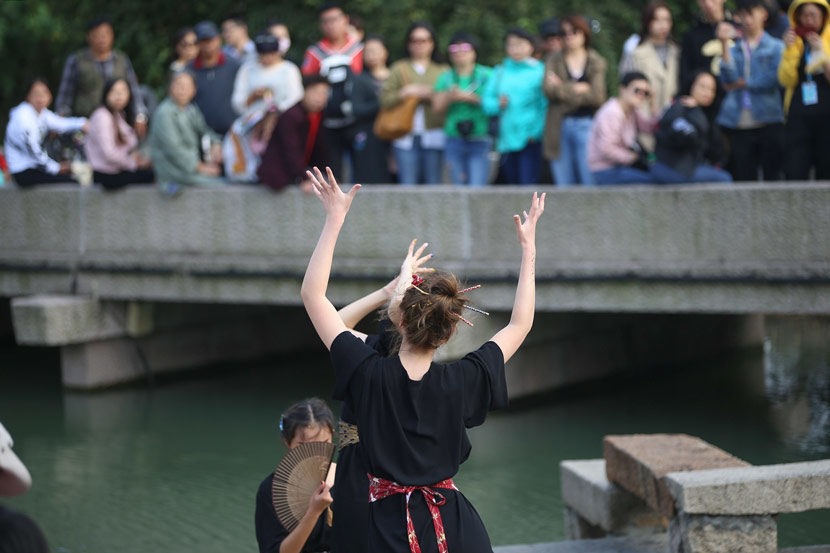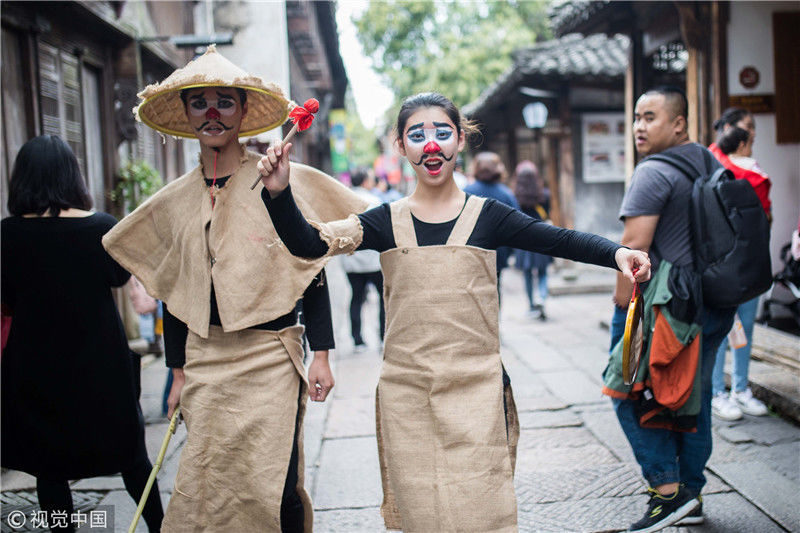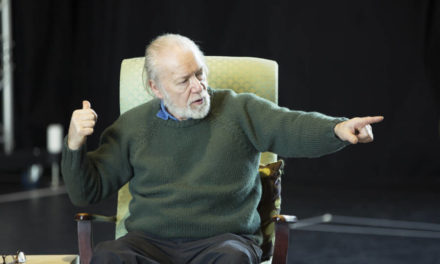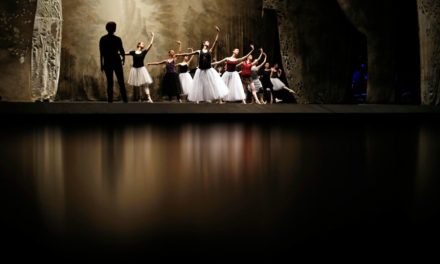After a divisive Wuzhen Theatre Festival, the Chinese theater must reassess its priorities.
The sixth annual Wuzhen Theatre Festival, which opened on October 18, started off with a bang.
Capping the festival’s first night was a polarizing rendition of Lao She’s 1957 masterwork, Teahouse. Those who enjoyed the show, which was helmed by well-known director Meng Jinghui, praised it for its complex, ambiguous, and distinctly German-influenced staging; those on the other end of the spectrum argued that, by reworking the original’s narrative structure and incorporating foreign elements, Meng had disrespected a Chinese classic.
The ensuing 10 days did little to soothe people’s tempers. Alternating between unorthodox performances of international classics such as The Cherry Orchard and avant-garde local offerings like the feminist Digging A Hole or the experimental Popular Mechanics, the festival had some audience members demanding refunds. Vehement public reactions to some controversial staging might not raise eyebrows at the Edinburgh International Festival or the Festival d’Avignon, but it was a first for Wuzhen—which has spent the past six years cultivating a reputation for itself as a theatrical theme park: a safe, noncontroversial, and largely—ironically—drama-free party for theater lovers of all stripes.
The Wuzhen festival is held each year in Xizha, part of the ancient Yangtze River town that gives the Wuzhen Theatre Festival its name. In 2007, much of Xizha was essentially “Disneyfied”—its Ming and Qing dynasty architecture, well-worn streets, and canals crisscrossed by ancient bridges becoming part of a well-curated theme park.
This setting has made Wuzhen something of a curiosity in the world of big-league theater festivals: None of the world’s major players take place in a closed off tourist town that requires a ticket just to enter. Whether in Edinburgh, Avignon, Berlin, or Amsterdam, other prominent festivals intermingle with the fabric of local urban life, and audiences are constantly moving between the world of the theater and the one located just outside the theater doors.
Wuzhen, however, exists in its own self-contained universe. During the festival, there are dozens of performances crammed into an area of less than 5 square kilometers, and portraits of playwrights ranging from William Shakespeare to Tang Xianzu hang along the walls of the town’s ancient Chinese alleyways. In some ways, this is an advantage: There are nights when it seems as though every restaurant in town is hosting an after-party and the streets brim with theater-loving revelers. Indeed, theater is pretty much the only topic of conversation at Wuzhen for the duration of the festival, and the overall dream-like quality of the experience has been a hit with visitors.
Wuzhen also benefits from China’s large population and dearth of prominent theater festivals. Theater fans and enthusiasts from all over the country have proven willing to pay high prices—some tickets to Wuzhen cost more than $125—for the chance to see performances by some of the best theater troupes in China and from around the world. Organizers have worked to get prestigious international productions to perform at the festival, and there were 14 such performances this year, up from four just six years ago.

Actors perform for the crowd during the sixth annual Wuzhen Theatre Festival in Wuzhen Town, Zhejiang province, Oct. 19, 2018. IC
Yet for all this high-minded talk of theater and art, the festival is at its heart a commercial venture: It was established in part to draw more tourists to Xizha and boost the local economy, and while four of its five co-founders come from theater backgrounds, it’s Chen Xianghong—an entrepreneur and the president of Culture Wuzhen Company Limited, the private company that puts on the festival—who holds the reins. The company’s business model, with its liberal mixture of art, tourism, and state-directed development priorities, is characteristic of a number of post-reform projects in China, and in some ways may have anticipated the Ministry of Culture and Tourism’s recent emphasis on what it calls “cultural experience tourism.”
Only time will tell how long this model can satisfy everyone, however, and this year’s festival may have offered a preview of battles to come. Although there’s been an increased number of international troupes performing at Wuzhen in recent years, this year’s organizers also staged several more experimental domestic productions. The result: an audience split down the middle.
Each year, the festival attracts white-collar workers from across China who have a hobbyist’s interest in theater. Living and working in cities with little in the way of a theater scene, they take time off work to attend Wuzhen’s event. They are there to see the best the theater world has to offer and have little patience for what they view as self-indulgent experimentation. Standing opposite them are the members of the theater world itself—critics, students, actors, directors, and others—who tend to be more interested in, and tolerant of, unsuccessful experiments and bold young playwrights flexing their dramatic muscles. If Wuzhen’s organizers want to cement the festival’s global reputation, they must cater to this latter group, even while placating its casual audiences.
It might help if the selection process was more transparent. At the Berlin Theatertreffen—another prominent festival—members of the selection committee post the details of every play they’ve seen, which works they’ve discussed, and each voting round’s results. It also rotates judges to prevent one particular branch or school from dominating. Not only does this ensure a wider variety of works are performed, it helps shield the festival itself from criticisms of bias, while ensuring that, just because the festival is ill-received one year, views won’t necessarily carry over into the next.
In the long run, however, Wuzhen faces a far more serious problem: the state’s dominance over China’s theater programs. Unlike in the United States, for example, where the National Endowment for the Arts will parcel out grants to support small theater troupes around the country, Chinese arts authorities tend to only invest in state-run or state-affiliated groups. Thus, even young directors and producers that stand out in the Wuzhen Theatre Festival’s “Young Theatre Artists Competition,” or in other NGO-run youth competitions, often find it difficult to secure resources for additional work while outside the system. And within the system, politics and seniority tend to have a stifling impact on art.
As a consequence, China—and Wuzhen—can boast few accomplished local theater directors between the ages of 30 and 45, a failing that stands out all the more when one considers emerging stars such as France’s Julien Gosselin or Germany’s Ersan Mondtag. And because the younger generation of directors is largely unheard of among more casual theatergoers, audiences are less likely to give them the benefit of the doubt when it comes to less straightforward works. Meanwhile, too many of the country’s current generation of directors and producers are given to self-indulgence, poor use of technology, and cliché material.
Moving forward, the Wuzhen Theatre Festival must decide whether it is willing to risk audience backlash—and potential financial losses—in pursuit of artistic achievement. If it is, then organizers should begin funding and supporting a new generation of independent young directors—one capable of galvanizing Chinese audiences and putting needed pressure on the artistic establishment to innovate and keep up. Only then will Chinese drama be able to take its place on the world stage.
Translated by: David Ball
Edited by: Wu Haiyun and Kilian O’Donnell
This article originally appeared in Sixthtone on November 9, 2018, and has been reposted with permission.
This post was written by the author in their personal capacity.The opinions expressed in this article are the author’s own and do not reflect the view of The Theatre Times, their staff or collaborators.
This post was written by Chen Tian.
The views expressed here belong to the author and do not necessarily reflect our views and opinions.


















